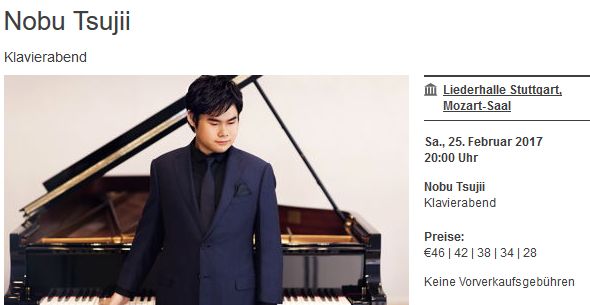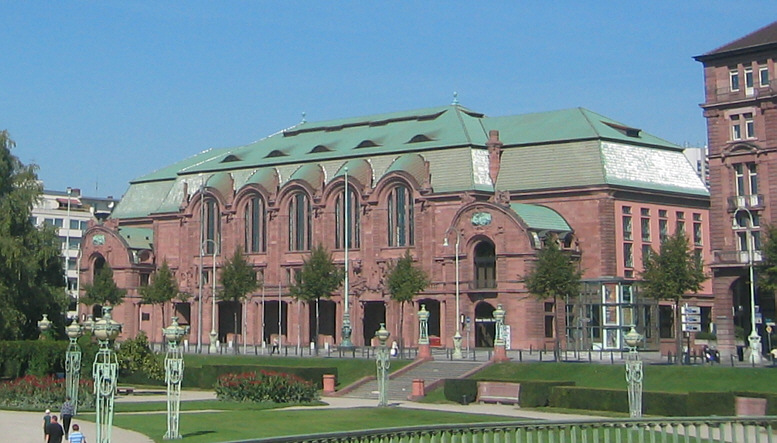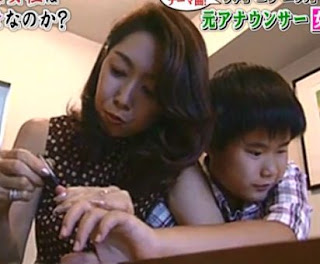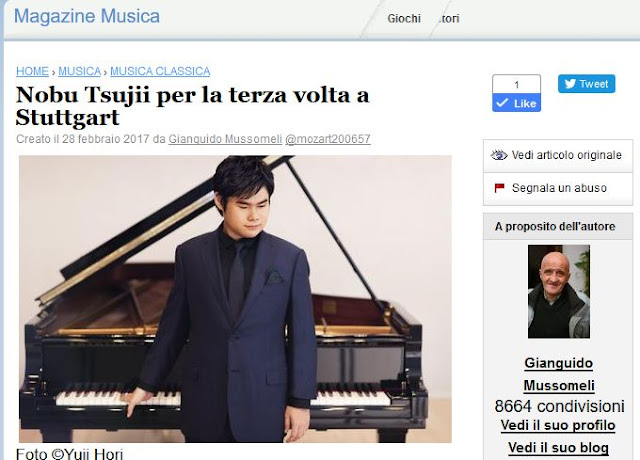Nobuyuki Tsujii is on tour with Orchestre Philharmonique de Strasbourg in Feb 2017
One of the six performances took place on February 12 20:0 at the Graf-Zeppelin-Huas Friedrichshafen, Germany
Concert information
![]()
The following article was posted by the German regional newspaper Südkurier on February 13. The English translation was generated by Google, touched up slightly by me in the paragraphs relevant to Nobu's performance.
The original article can be read here:
http://www.suedkurier.de/region/bodenseekreis-oberschwaben/friedrichshafen/Japanischer-Pianist-Nobu-Tsujii-brilliert-in-Friedrichshafen;art372474,9129222
Japanese pianist Nobu Tsujii Brilliant in Friedrichshafen
The Japanese pianist cannot see the light of day. This does not detract from his close collaboration with the Orchester philharmonique de Strasbourg at the GZH. Conductor Marko Letonja does not give the orchestra any reins, but leaves the musicians a lot of space to interpret.
With the program of its last subscription concert, the Orchester philharmonique de Strasbourg started a small tour through Germany and Switzerland, stopping in Friedrichshafen on Sunday evening.
With fast, rising Fortissimo violin strings, answered by hectic woodwind syncopations, the first bars of the concerto "Le Corsaire" captured the listeners. In the music of the Frenchman Berlioz, which goes back to a story by Lord Byron, the musicians from Strasbourg shone with a deeply impressive homogeneity. Only with small movements did chief-officer Marko Letonja form the mood of the whipping sea-storms, but also the soul-storms of the corsaries internally interspersed with sensitive depth and combative determination. After the agogically uniform string adagio, many changes in dynamics and accent shifts, radiantly bright sheet metal with the main theme, a powerful tutticlang in the Coda led to the crowning conclusion.
With a powerful, full-grip crash over six octaves, Nobu Tsujii began the concerto for piano and orchestra in A minor by Edvard Grieg. The winds were replaced by the catchy, punctured main theme. The string of the orchestra received him sonorously, and after an increase to the piano, the assignment was prepared for the soloist. He took the lead in a calm flow, changed to a vocal character, interpreted the side theme cheerful and playful. In the performance, the main lyric theme was played by delicate piano orchestras. Beautiful dialogues with the Soloblazers followed.
After a Fortissimo outburst of the otherwise sensitive orchestra one marveled at the virtuosity in the octave-rich cadence. Until here nothing unusual for a master concert. But Nobu Tsujii, born in Tokyo in 1988, is blind from birth. Working with the orchestra is no problem for him. "I feel the conductor breathing, I do not have to be able to see the baton to get the assignment." Thus the interplay in the second movement between the muted strings and the fine-tuned ornaments in the piano treble was all the more fascinating. With skillful articulation and sharp accents, the orchestra and soloist succeeded in bringing the Norwegian color to flower in the dancer's third movement. Intense strings, high wind chords, blazing brass fanfares and intoxicating piano scales in the Coda led to the never-ending applause. Thus, after the first movement of the "moonlight sonata," Nobu Tsujii gave Chopin's "revolutionary drama" as a second encore in bravura.
The Symphony No. 3 in E flat major by Robert Schumann, with the nickname "Rheinische", combines a volksnahes color with classical gestaltungsmitteln and romantic Gestus. The orchestra, with its French elegance, gave the life-affirming theme in the opening sentence, which had already been written with "Lebhaft". Humorous, far from the raging Scherzo of a Beethoven, the rural-like second sentence. Great praise to the excellent horn quartet in the lyric composition! The clarinets and bassoons, with a dreamy intensity, described the mood in the third movement "Not fast".
A homophonic brass choral opening opened the fourth movement "ceremonial". The recurring, now figurated chorale, after fugue-like sections. Great the return in the gloomy fading Coda.
In the fifth set, the return in full tutti to the serene basic mood succeeded with great playfulness. After a repeated recourse to the preceding chorale of the fourth movement, a grandiose, fast-paced coda decided the symphony. A lot of applause for a memorable performance under the conductor Marko Letonja, who gave his musicians a wide space for free interpretation.
-----------------
The German text of the original article is preserved below- for archival.
Japanischer Pianist Nobu Tsujii brilliert in Friedrichshafen
Dem japanischen Pianist fehlt das Augenlicht. Das tut seinem engen Zusammenspiel mit dem Orchestre philharmonique de Strasbourg im GZH aber keinen Abbruch. Dirigent Marko Letonja legt dem Orchester zudem keine Zügel an, sondern lässt den Musikern viel Raum zur Gestaltung.
Mit dem Programm ihres letzten Abonnementkonzerts startete das Orchestre philharmonique de Strasbourg eine kleine Tournee durch Deutschland und die Schweiz in Friedrichshafen am Sonntagabend.
Mit schnellen, aufsteigenden Fortissimo-Violinläufen, beantwortet von hektischen Holzbläser-Synkopen, packten die ersten Takte der Konzertouvertüre "Le Corsaire" die Zuhörer. In der Musik des Franzosen Berlioz, die auf eine Erzählung Lord Byrons zurückgeht, glänzten die Musiker aus Strasbourg mit einer tief beeindruckenden Homogenität. Nur mit kleinen Bewegungen formte Chefdirigent Marko Letonja die Stimmung der peitschenden Meeresstürme, aber auch die Seelenstürme des innerlich zwischen empfindsamer Tiefe und kämpferischer Entschlossenheit gespaltenen Korsaren. Nach agogisch einheitlichem Streicheradagio, vielen Wechseln in der Dynamik und Akzentverschiebungen, strahlend hellem Blech mit dem gedehnten Hauptthema, führte ein kräftiger Tuttiklang in der Coda zum krönenden Abschluss.
Mit einem kraftvollen, vollgriffigem Absturz über sechs Oktaven begann Nobu Tsujii das Konzert für Klavier und Orchester a-Moll von Edvard Grieg. Zurückgenommen stellten die Bläser das eingängige, punktierte Hauptthema vor. Von den Streichern sonor aufgenommen, nach einer Steigerung ins Piano zurückgeführt, wurde der Einsatz für den Solisten vorbereitet. Dieser übernahm in ruhigem Fluss die Stimmführung, wechselte zu gesanglichem Charakter, gestaltete das Seitenthema heiter und verspielt. In der Durchführung wurde das nun lyrische Hauptthema von zarten Klaviergirlanden umspielt. Schöne Dialoge mit den Solobläsern folgten.
Nach einem Fortissimo-Ausbruch des sonst feinfühlig begleitenden Orchesters bestaunte man die Virtuosität in der oktavenreichen Kadenz. Bis hierhin nichts Ungewöhnliches für ein Meisterkonzert. Aber der in Tokio 1988 geborene Nobu Tsujii ist von Geburt an blind. Die Arbeit mit dem Orchester ist für ihn eigentlich kein Problem. "Ich spüre, wie der Dirigent atmet, ich muss den Taktstock nicht sehen können, um den Einsatz zu bekommen." So faszinierte das Zusammenspiel im zweiten Satz zwischen den gedämpften Streichern und den feingliedrigen Verzierungen im Klavier-Diskant umso mehr. Mit gekonnter Artikulation und scharfen Akzenten gelang es Orchester und Solist, die norwegische Farbe in dem tänzerischen dritten Satz zum Blühen zu bringen. Intensive Streichertremoli, hohe Bläserakkorde, schmetternde Blechbläser-Fanfaren und berauschende Klavierskalen in der Coda führten zum nicht enden wollenden Applaus. So gab Nobu Tsujii nach dem ersten Satz der "Mondscheinsonate" in bravourösem Spiel die "Revolutionsetüde" von Chopin noch als zweite Zugabe.
Die Sinfonie Nr. 3 Es-Dur von Robert Schumann, mit dem Beinamen "Rheinische" verbindet volksnahes Kolorit mit klassischen Gestaltungsmitteln und romantischem Gestus. Schon im mit "Lebhaft"überschriebenen Eröffnungssatz vermittelte das Orchester mit französischer Eleganz das lebensbejahende Hauptthema. Humorvoll, weit weg vom tobenden Scherzo eines Beethoven, der ländlerartige zweite Satz. Großes Lob dem hervorragenden Hornquartett im lyrischen Mittelsatz! Sehr schlicht und beschaulich schilderten die Klarinetten und Fagotte mit verträumter Intensität die Stimmung im dritten Satz "Nicht schnell".
Ein homophoner Blechbläserchoral eröffnete in großem Bogen den vierten Satz "Feierlich". Nach fugenähnlichen Abschnitten der wiederkehrende, jetzt figurierte Choral. Großartig die Rücknahme in der düster verklingenden Coda.
Mit großer Spielfreude gelang im fünften Satz die Rückkehr in vollem Tutti zur heiteren Grundstimmung. Nach nochmaligem Rückgriff auf den vorangegangen Choral des vierten Satzes beschloss eine grandiose, schneller werdende Coda die Sinfonie. Viel Applaus für einen im Gedächtnis bleibenden Auftritt unter dem Dirigenten Marko Letonja, der seinen Musikerinnen und Musikern breiten Raum zur freien Gestaltung gab.
One of the six performances took place on February 12 20:0 at the Graf-Zeppelin-Huas Friedrichshafen, Germany
Concert information

The following article was posted by the German regional newspaper Südkurier on February 13. The English translation was generated by Google, touched up slightly by me in the paragraphs relevant to Nobu's performance.
The original article can be read here:
http://www.suedkurier.de/region/bodenseekreis-oberschwaben/friedrichshafen/Japanischer-Pianist-Nobu-Tsujii-brilliert-in-Friedrichshafen;art372474,9129222
Japanese pianist Nobu Tsujii Brilliant in Friedrichshafen
The Japanese pianist cannot see the light of day. This does not detract from his close collaboration with the Orchester philharmonique de Strasbourg at the GZH. Conductor Marko Letonja does not give the orchestra any reins, but leaves the musicians a lot of space to interpret.
With the program of its last subscription concert, the Orchester philharmonique de Strasbourg started a small tour through Germany and Switzerland, stopping in Friedrichshafen on Sunday evening.
With fast, rising Fortissimo violin strings, answered by hectic woodwind syncopations, the first bars of the concerto "Le Corsaire" captured the listeners. In the music of the Frenchman Berlioz, which goes back to a story by Lord Byron, the musicians from Strasbourg shone with a deeply impressive homogeneity. Only with small movements did chief-officer Marko Letonja form the mood of the whipping sea-storms, but also the soul-storms of the corsaries internally interspersed with sensitive depth and combative determination. After the agogically uniform string adagio, many changes in dynamics and accent shifts, radiantly bright sheet metal with the main theme, a powerful tutticlang in the Coda led to the crowning conclusion.
With a powerful, full-grip crash over six octaves, Nobu Tsujii began the concerto for piano and orchestra in A minor by Edvard Grieg. The winds were replaced by the catchy, punctured main theme. The string of the orchestra received him sonorously, and after an increase to the piano, the assignment was prepared for the soloist. He took the lead in a calm flow, changed to a vocal character, interpreted the side theme cheerful and playful. In the performance, the main lyric theme was played by delicate piano orchestras. Beautiful dialogues with the Soloblazers followed.
After a Fortissimo outburst of the otherwise sensitive orchestra one marveled at the virtuosity in the octave-rich cadence. Until here nothing unusual for a master concert. But Nobu Tsujii, born in Tokyo in 1988, is blind from birth. Working with the orchestra is no problem for him. "I feel the conductor breathing, I do not have to be able to see the baton to get the assignment." Thus the interplay in the second movement between the muted strings and the fine-tuned ornaments in the piano treble was all the more fascinating. With skillful articulation and sharp accents, the orchestra and soloist succeeded in bringing the Norwegian color to flower in the dancer's third movement. Intense strings, high wind chords, blazing brass fanfares and intoxicating piano scales in the Coda led to the never-ending applause. Thus, after the first movement of the "moonlight sonata," Nobu Tsujii gave Chopin's "revolutionary drama" as a second encore in bravura.
The Symphony No. 3 in E flat major by Robert Schumann, with the nickname "Rheinische", combines a volksnahes color with classical gestaltungsmitteln and romantic Gestus. The orchestra, with its French elegance, gave the life-affirming theme in the opening sentence, which had already been written with "Lebhaft". Humorous, far from the raging Scherzo of a Beethoven, the rural-like second sentence. Great praise to the excellent horn quartet in the lyric composition! The clarinets and bassoons, with a dreamy intensity, described the mood in the third movement "Not fast".
A homophonic brass choral opening opened the fourth movement "ceremonial". The recurring, now figurated chorale, after fugue-like sections. Great the return in the gloomy fading Coda.
In the fifth set, the return in full tutti to the serene basic mood succeeded with great playfulness. After a repeated recourse to the preceding chorale of the fourth movement, a grandiose, fast-paced coda decided the symphony. A lot of applause for a memorable performance under the conductor Marko Letonja, who gave his musicians a wide space for free interpretation.
-----------------
The German text of the original article is preserved below- for archival.
Japanischer Pianist Nobu Tsujii brilliert in Friedrichshafen
Dem japanischen Pianist fehlt das Augenlicht. Das tut seinem engen Zusammenspiel mit dem Orchestre philharmonique de Strasbourg im GZH aber keinen Abbruch. Dirigent Marko Letonja legt dem Orchester zudem keine Zügel an, sondern lässt den Musikern viel Raum zur Gestaltung.
Mit dem Programm ihres letzten Abonnementkonzerts startete das Orchestre philharmonique de Strasbourg eine kleine Tournee durch Deutschland und die Schweiz in Friedrichshafen am Sonntagabend.
Mit schnellen, aufsteigenden Fortissimo-Violinläufen, beantwortet von hektischen Holzbläser-Synkopen, packten die ersten Takte der Konzertouvertüre "Le Corsaire" die Zuhörer. In der Musik des Franzosen Berlioz, die auf eine Erzählung Lord Byrons zurückgeht, glänzten die Musiker aus Strasbourg mit einer tief beeindruckenden Homogenität. Nur mit kleinen Bewegungen formte Chefdirigent Marko Letonja die Stimmung der peitschenden Meeresstürme, aber auch die Seelenstürme des innerlich zwischen empfindsamer Tiefe und kämpferischer Entschlossenheit gespaltenen Korsaren. Nach agogisch einheitlichem Streicheradagio, vielen Wechseln in der Dynamik und Akzentverschiebungen, strahlend hellem Blech mit dem gedehnten Hauptthema, führte ein kräftiger Tuttiklang in der Coda zum krönenden Abschluss.
Mit einem kraftvollen, vollgriffigem Absturz über sechs Oktaven begann Nobu Tsujii das Konzert für Klavier und Orchester a-Moll von Edvard Grieg. Zurückgenommen stellten die Bläser das eingängige, punktierte Hauptthema vor. Von den Streichern sonor aufgenommen, nach einer Steigerung ins Piano zurückgeführt, wurde der Einsatz für den Solisten vorbereitet. Dieser übernahm in ruhigem Fluss die Stimmführung, wechselte zu gesanglichem Charakter, gestaltete das Seitenthema heiter und verspielt. In der Durchführung wurde das nun lyrische Hauptthema von zarten Klaviergirlanden umspielt. Schöne Dialoge mit den Solobläsern folgten.
Nach einem Fortissimo-Ausbruch des sonst feinfühlig begleitenden Orchesters bestaunte man die Virtuosität in der oktavenreichen Kadenz. Bis hierhin nichts Ungewöhnliches für ein Meisterkonzert. Aber der in Tokio 1988 geborene Nobu Tsujii ist von Geburt an blind. Die Arbeit mit dem Orchester ist für ihn eigentlich kein Problem. "Ich spüre, wie der Dirigent atmet, ich muss den Taktstock nicht sehen können, um den Einsatz zu bekommen." So faszinierte das Zusammenspiel im zweiten Satz zwischen den gedämpften Streichern und den feingliedrigen Verzierungen im Klavier-Diskant umso mehr. Mit gekonnter Artikulation und scharfen Akzenten gelang es Orchester und Solist, die norwegische Farbe in dem tänzerischen dritten Satz zum Blühen zu bringen. Intensive Streichertremoli, hohe Bläserakkorde, schmetternde Blechbläser-Fanfaren und berauschende Klavierskalen in der Coda führten zum nicht enden wollenden Applaus. So gab Nobu Tsujii nach dem ersten Satz der "Mondscheinsonate" in bravourösem Spiel die "Revolutionsetüde" von Chopin noch als zweite Zugabe.
Die Sinfonie Nr. 3 Es-Dur von Robert Schumann, mit dem Beinamen "Rheinische" verbindet volksnahes Kolorit mit klassischen Gestaltungsmitteln und romantischem Gestus. Schon im mit "Lebhaft"überschriebenen Eröffnungssatz vermittelte das Orchester mit französischer Eleganz das lebensbejahende Hauptthema. Humorvoll, weit weg vom tobenden Scherzo eines Beethoven, der ländlerartige zweite Satz. Großes Lob dem hervorragenden Hornquartett im lyrischen Mittelsatz! Sehr schlicht und beschaulich schilderten die Klarinetten und Fagotte mit verträumter Intensität die Stimmung im dritten Satz "Nicht schnell".
Ein homophoner Blechbläserchoral eröffnete in großem Bogen den vierten Satz "Feierlich". Nach fugenähnlichen Abschnitten der wiederkehrende, jetzt figurierte Choral. Großartig die Rücknahme in der düster verklingenden Coda.
Mit großer Spielfreude gelang im fünften Satz die Rückkehr in vollem Tutti zur heiteren Grundstimmung. Nach nochmaligem Rückgriff auf den vorangegangen Choral des vierten Satzes beschloss eine grandiose, schneller werdende Coda die Sinfonie. Viel Applaus für einen im Gedächtnis bleibenden Auftritt unter dem Dirigenten Marko Letonja, der seinen Musikerinnen und Musikern breiten Raum zur freien Gestaltung gab.





































